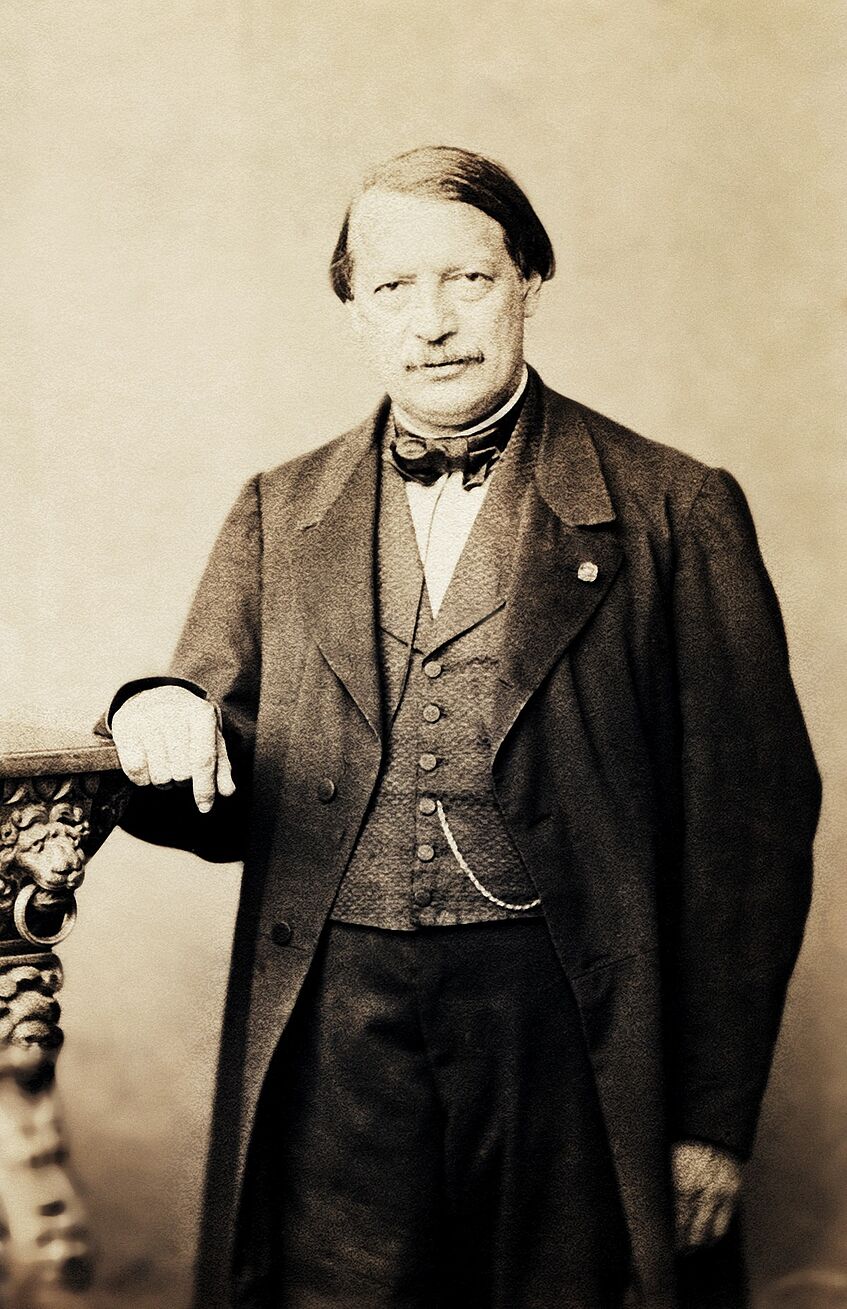Hendrik Conscience
Flämisches Stillleben is a collection of three novellas by the Belgian author Hendrik Conscience (1812-1883) translated into German by Melchior von Diepenbrock: Wat eene moeder lijden kan (Was eine Mutter leiden kann), Siska van Roosemael (Siska van Rosemal) and Hoe men schilder wordt (Wie man Maler wird). What the stories have in common is their setting in nineteenth-century Antwerp, the hometown of Conscience.
Works and Career

Photograph of Hendrik Conscience by Charles D'Hoy, ca. 1863. [Collectie Stad Antwerpen, Letterenhuis]
Works and Career
When the tales were first published in the early 1840s, the Antwerp author had just experienced his first major success with the publication of De leeuw van Vlaenderen (1838), a historical novel about the medieval Battle of the Golden Spurs. This novel has contributed to the mythologization of this event in Flemish cultural memory and has attained the status of a national epic (Berg, van den 413).
The first successful Dutch-language novelist of Belgium, Conscience became one of the main literary representatives of the nineteenth-century Flemish Movement. By choosing to write in Dutch and because of his popularity among a wide range of readers from different social classes, Conscience became known as “the man who taught his people how to read”.
Although most of Conscience’s works are influenced by the Romanticist tradition, his later novels show traces of Realism, which became the dominant literary fashion towards the end of the nineteenth century (Berg, van den and Couttenier 675). Because of their sentimental and moralizing tone, later generations of readers and writers tend to regard Conscience’s works as outdated. Nevertheless, Conscience is considered a literary pioneer of his time, having introduced genres like the historical novel, the rural novel and the novel of manners into Flemish literature.
Conscience in Translation
Conscience in Translation
Conscience’s literary fame rapidly spread across national borders after the German publication of Flämisches Stillleben (Regensburg, 1845). In the second half of the nineteenth century, Hendrik Conscience became the most translated Dutch-language author. Between 1830 and 1880, two out of three translations of Dutch literature into German were works by Conscience (Van Uffelen 38). In many other languages, Conscience was the first Dutch-language author to be translated (Engelbrecht 239). Up to date, the DLBT database contains records of 476 translations of Conscience’s works into German, 175 translations into French, 144 translations into English, 55 translations into Czech, and 31 translations into Italian, to name only the top 5 languages in the database.*
The novels of Conscience turned out to be so popular that they were not only translated, but also copied, re-used and plagiarized. In England, translations of De gierigaerd (The Miser, 1868) and Baes Gansendonck (The Village Innkeeper, 1871), published in London by Bradbury, Evans, & Co, mention ‘Hope Inslow’ as the author. In France, Alexandre Dumas plagiarized two chapters from De loteling for a novel, reportedly with the permission of the author. To express his gratitude, Dumas named his novel Conscience l’innocent (1852). Although Conscience himself denied having consented to Dumas's use of chapters from his novel (Andringa), generally, Conscience was very supportive of the translators of his work, allowing them to adjust his works to the taste of foreign audiences (Van Uffelen 60–61).
Most of Conscience’s translations sold well; several German translations were published in different editions or were reprinted more than ten times. Some translations into English and French also experienced multiple reprints. However, this international success did not last. Conscience’s international popularity peaked in the 1850s and again around the time of his death in 1883, but since then the number of translations has steadily declined.
* Please note that DLBT does not provide an exhaustive overview and is a ‘living’ database which can be continuously updated and supplemented, so the data are subject to change.
Translated Works of Conscience
Translated Works of Conscience
Follow the link to download all translations of works by Conscience in the DLBT.
Select Bibliography
Andringa, Kim. “Grote Scheppen Zoete Broodpap: De Receptie van Hendrik Conscience in Frankrijk.” Hendrik de Veroveraar: De Wereld van Conscience, Conscience in de Wereld (1812-2012), edited by Piet Couttenier and Walter Verschueren, Koninklijke Academie voor Nederlandse Taal-en Letterkunde (KANTL), 2013, pp. 273–96.
Berg, van den, Willem. “The Nineteenth Century, 1800-1880.” A Literary History of the Low Countries, edited by Theo Hermans, Camden House, 2009, pp. 369–462.
Berg, van den, Willem, and Piet Couttenier. Alles is taal geworden. Geschiedenis van de Nederlandse literatuur 1800-1900. Bert Bakker, 2009.
Couttenier, Piet, and Walter Verschueren, editors. Hendrik De Veroveraar. Koninklijke Academie voor Nederlandse Taal-en Letterkunde (KANTL), 2013.
Engelbrecht, Wilken. “De Tsjechische Conscience.” De Grote Onleesbare. Hendrik Conscience Herdacht., edited by Kris Humbeeck et al., Academia Press, 2016, pp. 239–64.
Gera, Judit. “Een Vlaamse leeuw de grenzen voorbij.” Internationale Neerlandistiek, vol. 54, no. 3, 2016, pp. 163–68.
Hermans, Theo. “The Highs and Lows of Hendrik Conscience.” The Low Countries, vol. 22, 2014, pp. 162–68.
Humbeeck, Kris, et al., editors. De grote onleesbare. Hendrik Conscience herdacht. Academia Press, 2016.
Keersmaekers, August Albert. Hendrik Conscience: de muze en de mammon. Koninklijke Academie voor Nederlandse Taal- en Letterkunde, 2009.
Van Uffelen, Herbert. Moderne niederländische Literatur im deutschen Sprachraum 1830-1990. Zentrum für Niederlande-Studien, 1993.
Wauters, Karel. Hendrik Conscience: van geboorte tot Leeuw, 1812-1838. ASP, Academic & Scientific Publishers ; Letterenhuis, 2012.
Wauters, Karel. “Het Vlaamse Fictionele Proza van Conscience Tot Loveling.” Hoofdstukken Uit de Geschiedenis van de Vlaamse Letterkunde in de 19de Eeuw, edited by Ada Deprez et al., vol. 1, Koninklijke Academie voor Taal- en Letterkunde, 1999, pp. 147–310.
